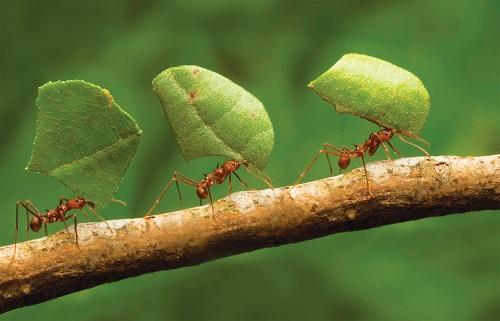This is Scientific American — 60-Second Science. I'm Karen Hopkin.
Got a minute?
Next time you need directions, maybe ask an ant. Because these clever little critters are such masters of navigation that some can find their way home… whether they're walking forward, backward, or sideways. That's according to a study in the journal Current Biology.
Ants often travel long distances—well, for them—when they're searching for food to bring back to their nests. And their built-in GPS appears to function just fine even when they wind up having to travel in reverse because they're dragging a huge morsel. But how do these backward bugs know where they're going?
To find out, researchers went to Spain to mess with some desert ants. They found an active nest and surrounded it with barriers that forced the foraging ants to follow a particular path back home. Once the ants were familiar with the maze, the researchers would scoop them up...hand them a cookie crumb...and then put them back in a different location...one that required taking a 90 degree turn to get to the nest.

What the researchers saw was that the ants that were carting a small, easy-to-carry crumb would dash forward with confidence and were able to hook a right and head on home. Presumably because they could see where they were going and recognized the route.
But some of their nest-mates were given a cookie crumb so large that they had to travel aft-first, pulling their prize behind them. These ants would set off in the correct general direction. But those that stuck with going in reverse would miss the turnoff to the nest.
Some of the rearward ants, however, stopped to get their bearings. They would drop the cookie and turn around to take a look at the landscape. This quick peek allowed the six-legged savants to reset their inner maps. So that after turning back around to grab their cookies they headed in the right direction, even going back-end first.
The ants-in-reverse appear to use celestial cues...like the position of the sun...to keep them on the straight and narrow. When the researchers used a mirror to make it look like the sun was on the other side of the sky, the beleaguered backward ants would turn tail for the opposite direction.
So ants integrate a lot of information...about local landmarks, the position of the sun, and where their bodies are situated in space...to successfully bring home the bacon... all while going backwards.
Lead author Antoine Wystrach, a CNRS researcher at the University of Toulouse 3, adds:
"This behavior is interesting in itself, as it implies a synergy between at least three types of memory: the long-term memories of the route sceneries, the memory of the new direction to follow, and the memory of the cookie left behind."
Thanks for listening for Scientific American — 60-Second Science Science. I'm Karen Hopkin.












